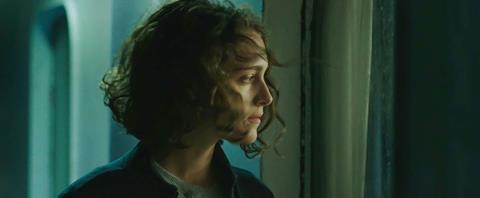Dir: Lucie Borleteau. France. 2014. 95mins

Sending a woman around the world to find her anchor may be a nice concept to begin with, but the script of Lucie Borleateau’s debut picture Fidelio – Alice’s Journey (Fidelio – L’odyssee d’Alice) lacks the necessary structure to sustain it all through or lead it securely into safe harbour, despite star Ariane Labed’s impressively uninhibited performance.
The most interesting aspect of Borleteau’s film remains Alice herself, perfectly served by Labed’s frank, uninhibited performance.
Her lusty heroine is a sailor - a woman in a profession generally identified with men, a second mechanic on a freighter - whose travels which take her away from her present boyfriend, are supposed to invite deeper reflections on such weighty matters as the meaning of life, love and sex. Ultimately, however, they do nothing of the kind and by the time the film is over, one is entitled to wonder to what extent she had been actually affected by her experiences.
Alice (Labed) says goodbye to her Norwegian companion Felix (Anders Danielsen Lie), who she claims to adore, and embarks on an old rickety ship named Fidelio, on which she had served before as a cadet. She has a one-month contract to replace a member of the crew who had been killed in an accident. As soon as she is on boat, she finds that the captain is Gael (Melville Poupaud), was once her lover, and that the dead man, whose cabin she inherited, had left behind a detailed diary which reveals the emptiness of an existence that should have been anything but boring, given the numerous and colorful, if brief, affairs he had.
A free-wheeling, liberated and intense character, excited by the words of the diary and by memories of her sexual attraction for Gael, Alice is soon back with him, rekindling a relationship that was not quite resolved in her mind but seems acceptable in the kind of temporary limbo they are offered by the boat at sea.
All this blends in effortlessly enough with the ship’s routines and with the atmosphere on board, coloured by Fidelio’s international crew, ranging from Romania to the Philippines, each one the members contributing a touch of his national culture, customs and religion to the general mood.
Most of the incidents taking place during Alice’s first, and subsequently second trip after she is promoted to first mechanic, including the sexual interludes, are predictable enough, whether it is engine trouble or man trouble (after all, a woman is a rarity in a ship’s crew), the problem being that the script hardly develops at all, paying exclusive attention to the protagonist only and very little to the sequence of events around her.
The rest of the characters seem to be just accidental tourists moving through her personal landscape, none really identified or explored in depth, with the possible exception of the dead man, Le Gall, a cautionary absence reminding Alice that unless she makes the right choices she may end up like him. Even the ship, which in such circumstances usually takes on a personality of its own and becomes a kind of protective shell from the outer world, never gets to be more than a serviceable backdrop to be discarded once the tale is over.
The most interesting aspect of Borleteau’s film remains Alice herself, perfectly served by Labed’s frank, uninhibited performance. An attractive, young, assertive woman, completely at ease with her sexuality, looking for an emotional balance in her life that would satisfy both body and soul. For a change, she has not chosen to be a sailor to see the world, but rather to find her own self, a challenge that is much more difficult accomplish, if at all.
Production companies; Apsara Films, Why Not Productions
Contact: Marina Arrighi de Casanova m.arrighi@apsarafilms.fr, Nicolas Livecchi, Nicolas@whynotproductions.fr
Screenplay: Lucie Bourleteau, Clara Bourreau
Cinematography: Simon Beaufils
Editor: Guy Lecorne
Production designer: Sidney Dubois
Music: Thomas de Pourquery
Main cast: Ariane Labed, Melville Poupaud, Anders Danielsen Lie, Pascal Tagnati, Corneliu Dragomirescu, Jean-Louis Coulloc’h, Bogdan Zamfir, Nathanael Maini, Manuel Ramirez




















